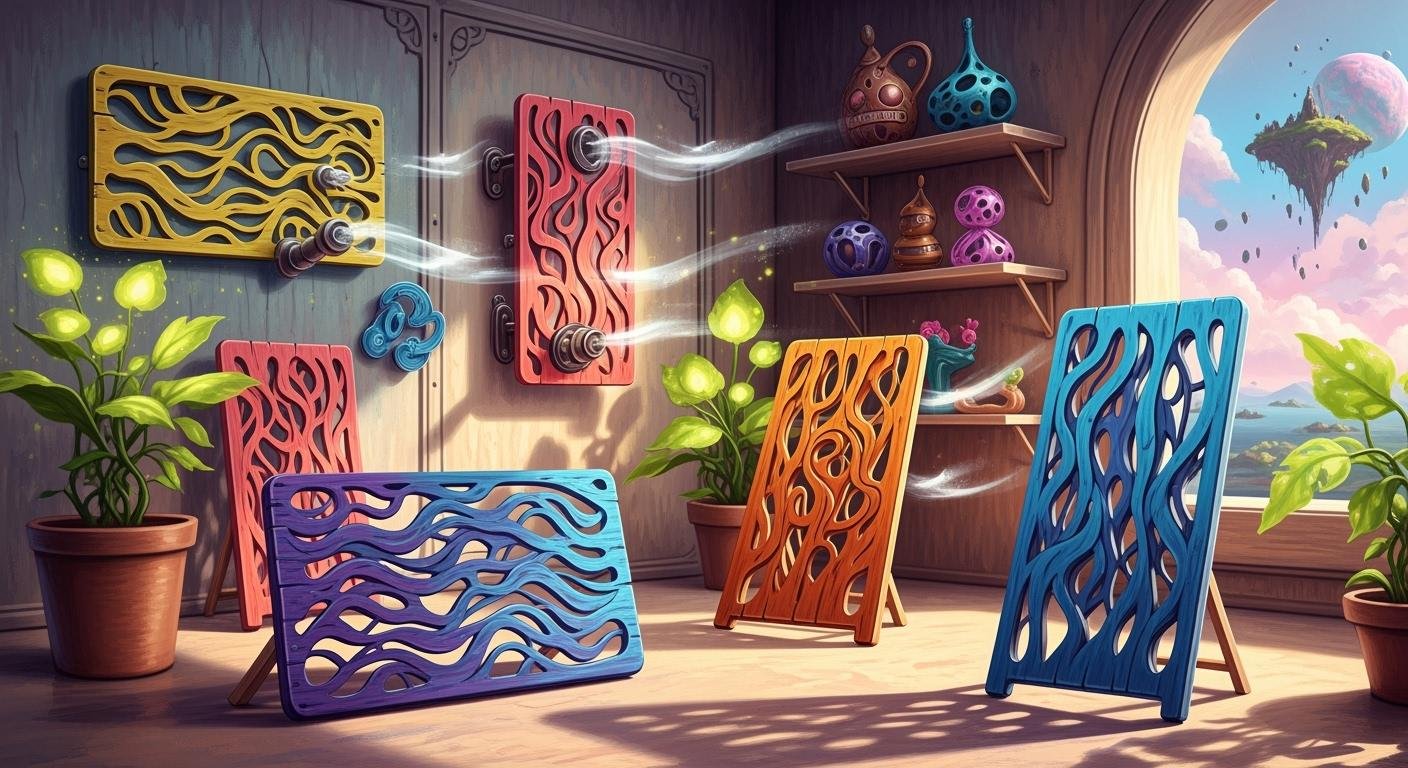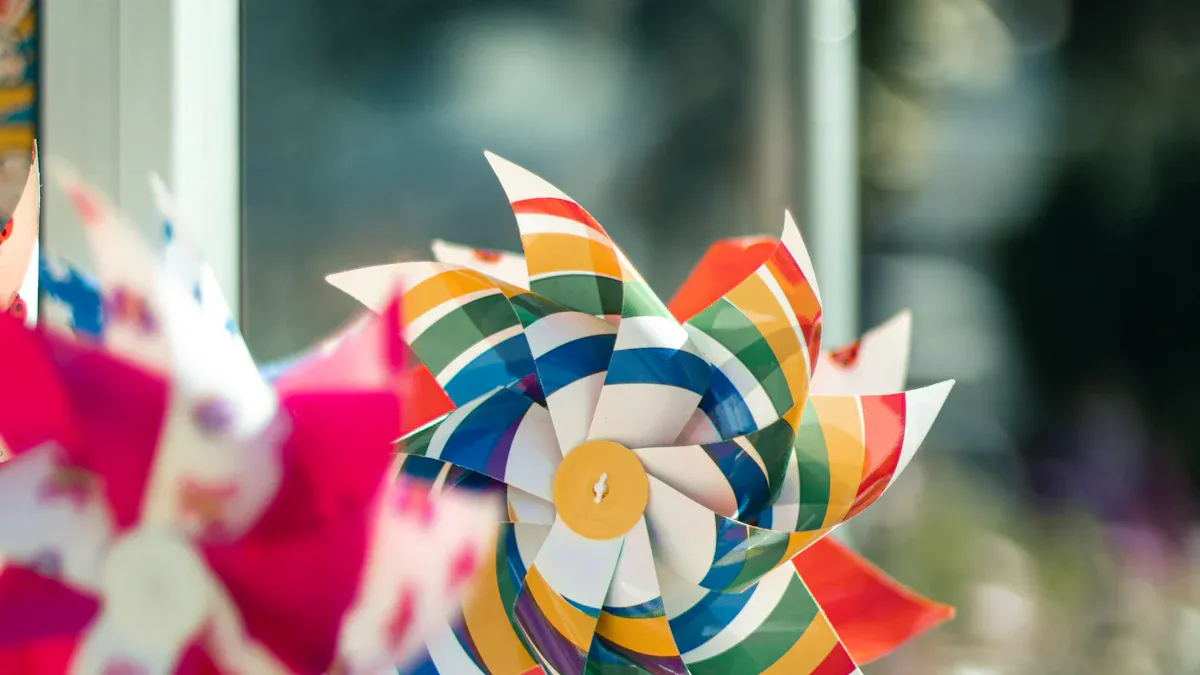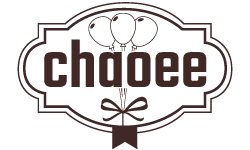
You can find wind-driven boards outside in many places. These boards have special shapes to stay up when it is windy. Some examples are A-frame signs, vinyl mesh banners, wind flags, and PVC foam boards. Many stores use custom window decals to make their windows look bright. Flags and teardrop flags move in the wind and get people to look at them. Teardrop flags use fabric that does not let water in and does not fade in the sun, so they are good for outdoor use. Wind-driven boards help you decorate and show ads, even when it is very windy.
Wind-resistant A-frame signs are good for busy places like restaurants or shops.
Flags move in the wind and catch the eyes of customers.
Key Takeaways
Wind-driven boards are made to stand up in windy weather. This makes them great for outdoor ads and decoration.
Pick the right wind-driven board for what you need. Use A-frame signs for sidewalks. Use flags for special events.
Find boards with shapes that help them face the wind. Choose boards made from strong materials. This helps them last longer and not break in strong winds.
Where you put your boards is important. Put them where many people can see them. Good spots are busy roads or walkways.
Take care of your wind-driven boards often. Clean them and check for any damage. This helps them stay nice for many years.
Wind-driven board basics

What is a wind-driven board
A wind-driven board is a sign you use outside. It works well even when it is windy. These boards have special shapes and strong materials. This helps them stand up and be seen when the wind blows. You can find them outside stores or at events. Their main job is to keep your message or decoration easy to see, no matter the weather.
Common types and materials
There are many kinds of wind-driven boards you can pick. Some popular ones are A-frame signs, vinyl mesh banners, wind flags, and PVC foam boards. Each type has its own good points. An A-frame sign sits on the ground and is great for sidewalks. Vinyl mesh banners use fabric that lets air go through. This stops them from flapping or tearing. Wind flags, like teardrop or feather flags, move with the wind and get people’s attention. PVC foam boards are light and strong, so you can move and set them up easily.
Here is a table that shows some common wind-driven boards and what they do:
Product Name | Wind Resistance | Features |
|---|---|---|
Wind Stand Outdoor Changeable Graphics Sign Board | 40 – 50 MPH | Durable rustproof plastic, fillable base |
Springer Ready-4-Graphics Sidewalk Sign | 40 – 50 MPH | Durable rustproof plastic, fillable base |
Two-Sided, Fillable Outdoor Windproof Sidewalk Sign Holder | Strong wind gusts | Tool-free assembly, 2-sided frame |
Wind Proof Outdoor Panel Curb Sign Stand | N/A | Aluminum construction, economical panel |
Top Loading Outdoor Wind Proof Curb Sign Stand | Strong wind gusts | Quick-changing top loading frame |
Manufacturers use tough materials to make these boards last longer. Many wind-driven boards use composite materials, like fiber reinforced polymers. These help the boards stay strong and light. Some boards use carbon fibers to make them stiffer, but this costs more. Others use both carbon and E-glass fibers to save money and still work well. New resin systems, such as thermoplastics, help make boards easier to recycle and build. When you pick a board, the material matters for how well it stands up to wind and how long it lasts.
Key features
Wind-driven boards have special features that help them work outside. You want a board that can handle wind load. This means it will not fall or break when the wind is strong. Designers use shapes like rounded edges or tapered surfaces. These help the wind move around the board instead of pushing hard against it. Some boards have holes or slits that let air go through. This lowers the force on the board.
Here are some important engineering ideas that help wind-driven boards stay strong and safe:
Material selection: Makers choose tough plastics or metals to make boards sturdy.
Aerodynamic design: Rounded edges and smooth surfaces help wind flow around the board.
Structural system design: Bracing and truss systems spread out wind force.
Anchorage and foundation: Secure bases or anchors stop the board from tipping.
Advanced technologies: Some boards use smart materials or new designs for better wind resistance.
Tip: When you choose a wind-driven board, look for features that fit your needs. If you need one for a very windy place, pick a board with a heavy base or extra wind slits.
A wind-driven board is a good way to show messages or decorations outside. With the right materials and design, your board can last a long time and stay safe, even in bad weather.
How wind-driven boards work
Mechanism and movement
Wind-driven boards move when the wind blows. Their design lets them sway or spin. This helps them stay up. Flags and banners use flexible poles. They also use light fabrics. These materials bend and twist. This stops the boards from snapping or falling. A-frame signs have strong bases. The base keeps the sign steady. When wind pushes, the board moves a bit. The base holds it in place. This movement grabs people’s attention. It helps your message stand out.
Wind resistance design
Designers use smart ideas to help boards fight strong winds. They try to lower wind load. Wind load is the force from the wind. Boards often have rounded edges. Some have tapered surfaces. These shapes let wind flow around the board. This stops wind from hitting hard. Some boards have holes or slits. Air passes through these holes. This lowers the pressure on the board. You can see how design elements work in the table below:
Design Element | Description |
|---|---|
Roof Sheathing | Secured panels make a strong base. |
30° Slope | Aerodynamic shape cuts uplift forces in half. |
Closed Valleys | Extra material blocks wind and water. |
Continuous Clips | Spread wind loads and allow expansion. |
Hurricane Straps | Connect roof to foundation for more strength. |
Tapered Edges | Smooth edges lower turbulence. |
Wind Baffles | Stop rain from coming in through vents. |
Staggered Seams | Block wind from going through seams. |
Reinforced Perimeters | Extra fasteners make edges stronger. |
These features help boards last longer. They keep boards safe in windy places.
Safety and durability
Manufacturers follow strict safety rules when making boards. You want your board to be safe for everyone. Here are some important safety rules:
The ANSI/ASSP A10.21 standard sets safety rules for wind generation places.
It covers finding hazards, worker training, and safety plans.
Designers look for hazards in turbine design. They make energization plans to stop electrocution.
The standard helps protect workers and keeps boards safe for all.
You get a board that stands up to bad weather. It keeps people safe. Strong materials and smart designs make boards last. You can trust them outside, even when the wind is strong.
Decorative uses

Indoor and outdoor decoration
Wind-driven boards can decorate inside and outside spaces. They work well in gardens, school entrances, and shopping centers. You can put them near walkways or at building doors. Smaller boards add color to hallways or lobbies indoors. Large banners outside help your message stand out. Many people use wind-driven boards for outdoor ads. These boards stay easy to see, even when it is windy. Your decoration lasts and keeps the area bright.
Tip: Put your boards where people walk a lot. This way, more people will see your message or design.
Visual impact
Wind-driven boards move and grab attention. Flags and banners move in the wind, so people notice them fast. Use bright colors and bold shapes to make your board pop. Designers think about how people see the board from different spots. In busy cities, use small flapper pieces for a fuller look. Lighting is important too. Sunlight can make shiny materials glow or cause glare. Sometimes, you want more shine to show off movement. Here is a table with design tips for visual impact:
Design Consideration | Description |
|---|---|
Façade Visibility | Think about how people see the board from different places. In crowded areas, use small flapper pieces for a fuller look. |
Lighting | Sunlight can change how the board looks. Shiny materials may glare, but sometimes more shine helps show movement. |
These ideas help make your wind-driven board look better and work well.
Benefits for events
Wind-driven boards are great for decorating events like fairs, sports games, and school festivals. You can use flags to guide guests or show sponsors. The moving boards get people’s attention and make the event look fun. You can change colors or pictures to match your theme. Event planners like wind-driven boards because they are easy to move and set up. They work for short or long events. Big banners help mark entrances or special spots. Guests can find important places and enjoy the lively look.
Advertising with wind-driven boards
Attracting attention
You want people to notice your message. Wind-driven boards help with this. Flags and banners move when the wind blows. The movement grabs people’s attention. Bright colors and bold pictures make your ad stand out. Put these boards near busy roads or store doors. You can also use them at events. People see signs that move or shake. The motion makes your message easy to spot.
Many businesses use wind-driven boards outside. You see them at car lots, stadiums, and malls. For example, a feather flag outside a coffee shop waves in the wind. People walking by look at the flag and see the deal. Moving signs work better than regular ones. You get more people to notice and visit.
Tip: Put your wind-driven board where the wind can reach it. Open spaces are best. More movement means more people will see your ad.
Customization options
You can change wind-driven boards to fit your ad needs. Pick the material, size, and frame you want. Some boards use strong molded plastic or white PVC board. Others use light corrugated plastic. Choose the graphic size that fits your space. Many boards print in full color on both sides. Your message shows from every direction.
Here is a table with popular ways to customize wind-driven boards:
Feature | Details |
|---|---|
Material | Durable molded plastic, 4mm corrugated plastic, White PVC Board |
Graphic Size | 24″ x 36″ |
Frame Type | Springed Slide In, Windsign, Wheeled Snap In |
Display Option | Frame + 1 Sign (Double Sided), Frame + 2 Signs (Single Sided) |
Printed Side | Full Color Both Sides |
Frame Material | Metal, Molded Plastic, Molded Plastic and Aluminum |
Quantity Options | 1 to 50 |
Turnaround Time | 2 to 5 Business Days |
Advanced Options | 1 Panel, 2 Panels |
Portability | Comes with wheels for easy movement |
Lightweight | Easy to carry with a handle |
Eye-catching | Flexible design sways with the wind |
Replaceable Panels | Quick change feature for easy swapping |
Easy Assembly | Simple bolting to the base |
Order one board or many for a big ad campaign. Some boards have wheels. You can move them easily. You can swap panels to change your message fast. You set up your ad in just a few minutes. You do not need special tools.
Note: Custom wind-driven boards let you update your message often. You keep your ads new and exciting.
Effectiveness
Wind-driven boards work well in windy places. Moving signs help you reach more people. The motion gets attention, even from far away. Use these boards for outdoor ads at festivals, markets, and busy streets. For example, a vinyl mesh banner at a beach event stays up in strong wind. People see your message all day.
You can use wind-driven boards for online ads too. Take photos or videos of your moving signs. Share them on social media. The movement in your posts makes people look. You get more likes and shares.
Here are reasons why wind-driven boards help your ads work better:
Movement and color attract more customers.
Boards work well in windy spots.
You can change your message fast with new panels.
Easy setup and wheels save you time.
Bright designs help people remember your brand.
Tip: Use wind-driven boards for outdoor and online ads. Show your moving signs in videos to reach more people.
You get great results when you use wind-driven boards for ads. Your message stands out, no matter the weather.
Choosing and maintaining wind-driven boards
Selection tips
Think about your area before picking a wind-driven board. Some places have special animals or plants. Do not put boards near protected areas or old forests. This keeps animals and plants safe. You should also think about noise and how the board looks. Boards near homes or schools may need quiet designs or soft colors.
Here are steps to help you choose your board:
Stay away from important habitats like peat bogs.
Make sure there is road access and check for power lines.
Ask people in your community what they think so everyone agrees.
Tip: Always check local rules and get permits before you set up your board.
Placement advice
Where you put your board is important. You want people to see your message easily. Put boards so they face busy roads or walkways. Make sure nothing blocks the board, like trees or buildings. Boards should be big enough to read from far away. Use this rule: one inch of letter height for every ten feet people will view it.
Factor | Description |
|---|---|
Viewing distance | Make letters big enough to read from far away. |
Viewing angle | Put boards straight to the line of sight for best results. |
Obstruction | Look for trees, buildings, or things that might block the board. |
Traffic speed | Boards on slow roads get more attention. |
Time of day | Face boards toward busy morning or evening traffic. |
Demographics | Know who will see your board to share your message better. |
Note: Check your site in every season to keep your board easy to see all year.
Maintenance
You want your wind-driven board to last a long time. Taking care of it helps it work well. Look at your board often for cracks or damage. Clean moving parts and add oil so they do not wear out. Replace broken parts quickly. Check for lightning damage and keep safety systems working. In cold places, watch for ice and use anti-icing tools.
Check blades, gearboxes, and wires for problems.
Oil moving parts often.
Clean the board to stop dust and dirt from building up.
Write down any strange damage and fix it fast.
Tip: Get a professional to check your board once a year to find problems early.
You can see wind-driven boards from far away. They last a long time outside. These boards do not break in wind or rain. Regular vinyl banners do not work as well. Look at this table to compare them:
Feature | Wind-Driven Boards | Vinyl Banners |
|---|---|---|
Brightness | High (5,000+ nits) | Lower, fades outside |
Weatherproof | IP65 rated | Limited durability |
Lifespan | Years outdoors |
Wind-driven boards let you use fun designs and 3D looks. They are great for parties and big events. If you pick boards with strong protection, you help the planet too. Try wind-driven boards for your next project. You will get many good things from them.
FAQ
What makes wind-driven boards different from regular signs?
You see wind-driven boards use special shapes and strong materials. These boards stay up in windy weather. Regular signs may fall or tear. Wind-driven boards last longer outside.
Can you use wind-driven boards indoors?
You can use wind-driven boards inside. Smaller boards work well in hallways or lobbies. They add color and movement. You get a lively look for your space.
How do you clean and care for wind-driven boards?
You should check your board often for dirt or damage. Use a soft cloth and mild soap to clean surfaces. Oil moving parts if needed. Replace broken pieces quickly.
Are wind-driven boards safe for outdoor events?
You get safe boards when you follow maker instructions. Strong bases and tough materials keep boards steady. You protect guests and keep your event looking good.
Can you customize wind-driven boards for your business?
You choose colors, sizes, and graphics for your board. Many makers offer double-sided printing. You swap panels to update your message. Custom boards help your brand stand out.
